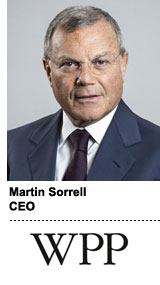
WPP, which reduced its full-year forecast Tuesday following a disappointing Q3, said it had invested mre than $7 billion on Google and Facebook this year as the No. 1 and No. 3 destinations for its clients’ media spend.
NewsCorp., Twenty-First Century Fox, Sky and Foxtel all tied as the second-largest destinations for client spend.
By comparison, WPP spent between $750 million and $2 billion with traditional media owners this year, said CEO Martin Sorrell on the company’s earnings call. Just five years ago, Google was the fourth-largest destination for WPP’s media investment, and Facebook was 28th.
“Maybe Facebook will move up to [second place],” Sorrell said. “They’ve become a big destination for us.”
Despite increased spending on the platforms, Sorrell said Google and Facebook aren’t eating WPP’s lunch by working directly with clients because they’re focused on the “long tail” of small businesses, while WPP is focused on large, multinational clients.
In terms of WPP’s financial performance, the holding company reduced its growth outlook to flat for the year due to mounting pressure from zero-based budgeters and cost-cutting clients driven by activist investors. Third-quarter revenue grew 0.8% YoY to $4.7 billion. Revenue for the first nine months of the year was flat at $14.1 billion.
“[Activist investors] are making acquisitions with a significant focus on cost,” he said. “When they take 1% positions in their target companies, the reflex action is to cut spending. We are seeing significant impacts on packaged goods companies in result of their activities.”
And that pressure is spreading internationally.
“Cost pressure has extended beyond the shores of the US, even to relatively faster-growth markets,” Sorrell said. “A number of multinational managers, for example, in China say they don’t have enough flexibility within the system to compete against local competition.”
To facilitate client needs in a pressured environment, WPP is consolidating agencies, putting together cross-agency teams with top talent and growing its digital and data investment management services. Sorrell said the industry has too many agencies, which makes for tough competition among agencies willing to “win at any promise.”
“Clients want the best people working on their business; they don’t particularly care which verticals they come from,” Sorrell said. “There we see opportunities, not in terms of revenue growth, but margin growth because it enables us to be more efficient as well as produce better work.”
Sorrell dismissed management consultancies as a competitive threat, but acknowledged they put pressure on WPP’s business by convincing clients to cut marketing spend to save costs.
“There are some wild estimates as to what the digital revenues of consultancies are,” he said. “The consultant inroads are more around their interactions with client CEOs where they say, ‘You’re spending too much, we’ll audit your spending and take a fee based on a contingency or success basis.’”
Still, Sorrell outlined the consulting expertise his organization is building around ecommerce within Wunderman and Xaxis-owned Triad. Xaxis will grow by high single to low double digits this year, said mPlatform CEO Brian Gleason.
“For Triad, we’ve leaned in quite aggressively to be able to work closely with Walmart, CVS and additional properties,” he said. “We’re in the process of building up the consulting practice, the product portfolio and [listening] to what clients need.”
This post was syndicated from Ad Exchanger.

More Stories
Warner Bros. Discovery CEO David Zaslav Receives $51.9 Million Pay Package for 2024
TikTok Fave Duolingo Boosts YouTube Shorts Viewership 430% in One Year
Streaming Ratings, Week of March 10: Disney+ Sails to the Top Courtesy of Moana 2